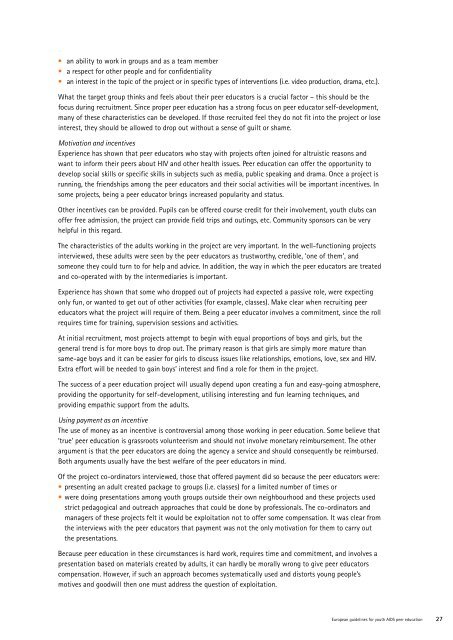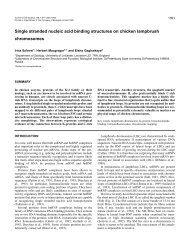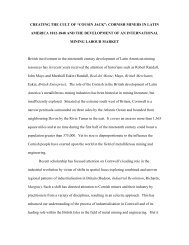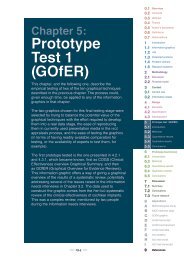European guidelines for youth AIDS peer education - University of ...
European guidelines for youth AIDS peer education - University of ...
European guidelines for youth AIDS peer education - University of ...
- No tags were found...
Create successful ePaper yourself
Turn your PDF publications into a flip-book with our unique Google optimized e-Paper software.
• an ability to work in groups and as a team member• a respect <strong>for</strong> other people and <strong>for</strong> confidentiality• an interest in the topic <strong>of</strong> the project or in specific types <strong>of</strong> interventions (i.e. video production, drama, etc.).What the target group thinks and feels about their <strong>peer</strong> educators is a crucial factor – this should be thefocus during recruitment. Since proper <strong>peer</strong> <strong>education</strong> has a strong focus on <strong>peer</strong> educator self-development,many <strong>of</strong> these characteristics can be developed. If those recruited feel they do not fit into the project or loseinterest, they should be allowed to drop out without a sense <strong>of</strong> guilt or shame.Motivation and incentivesExperience has shown that <strong>peer</strong> educators who stay with projects <strong>of</strong>ten joined <strong>for</strong> altruistic reasons andwant to in<strong>for</strong>m their <strong>peer</strong>s about HIV and other health issues. Peer <strong>education</strong> can <strong>of</strong>fer the opportunity todevelop social skills or specific skills in subjects such as media, public speaking and drama. Once a project isrunning, the friendships among the <strong>peer</strong> educators and their social activities will be important incentives. Insome projects, being a <strong>peer</strong> educator brings increased popularity and status.Other incentives can be provided. Pupils can be <strong>of</strong>fered course credit <strong>for</strong> their involvement, <strong>youth</strong> clubs can<strong>of</strong>fer free admission, the project can provide field trips and outings, etc. Community sponsors can be veryhelpful in this regard.The characteristics <strong>of</strong> the adults working in the project are very important. In the well-functioning projectsinterviewed, these adults were seen by the <strong>peer</strong> educators as trustworthy, credible, ‘one <strong>of</strong> them’, andsomeone they could turn to <strong>for</strong> help and advice. In addition, the way in which the <strong>peer</strong> educators are treatedand co-operated with by the intermediaries is important.Experience has shown that some who dropped out <strong>of</strong> projects had expected a passive role, were expectingonly fun, or wanted to get out <strong>of</strong> other activities (<strong>for</strong> example, classes). Make clear when recruiting <strong>peer</strong>educators what the project will require <strong>of</strong> them. Being a <strong>peer</strong> educator involves a commitment, since the rollrequires time <strong>for</strong> training, supervision sessions and activities.At initial recruitment, most projects attempt to begin with equal proportions <strong>of</strong> boys and girls, but thegeneral trend is <strong>for</strong> more boys to drop out. The primary reason is that girls are simply more mature thansame-age boys and it can be easier <strong>for</strong> girls to discuss issues like relationships, emotions, love, sex and HIV.Extra ef<strong>for</strong>t will be needed to gain boys’ interest and find a role <strong>for</strong> them in the project.The success <strong>of</strong> a <strong>peer</strong> <strong>education</strong> project will usually depend upon creating a fun and easy-going atmosphere,providing the opportunity <strong>for</strong> self-development, utilising interesting and fun learning techniques, andproviding empathic support from the adults.Using payment as an incentiveThe use <strong>of</strong> money as an incentive is controversial among those working in <strong>peer</strong> <strong>education</strong>. Some believe that‘true’ <strong>peer</strong> <strong>education</strong> is grassroots volunteerism and should not involve monetary reimbursement. The otherargument is that the <strong>peer</strong> educators are doing the agency a service and should consequently be reimbursed.Both arguments usually have the best welfare <strong>of</strong> the <strong>peer</strong> educators in mind.Of the project co-ordinators interviewed, those that <strong>of</strong>fered payment did so because the <strong>peer</strong> educators were:• presenting an adult created package to groups (i.e. classes) <strong>for</strong> a limited number <strong>of</strong> times or• were doing presentations among <strong>youth</strong> groups outside their own neighbourhood and these projects usedstrict pedagogical and outreach approaches that could be done by pr<strong>of</strong>essionals. The co-ordinators andmanagers <strong>of</strong> these projects felt it would be exploitation not to <strong>of</strong>fer some compensation. It was clear fromthe interviews with the <strong>peer</strong> educators that payment was not the only motivation <strong>for</strong> them to carry outthe presentations.Because <strong>peer</strong> <strong>education</strong> in these circumstances is hard work, requires time and commitment, and involves apresentation based on materials created by adults, it can hardly be morally wrong to give <strong>peer</strong> educatorscompensation. However, if such an approach becomes systematically used and distorts young people’smotives and goodwill then one must address the question <strong>of</strong> exploitation.<strong>European</strong> <strong>guidelines</strong> <strong>for</strong> <strong>youth</strong> <strong>AIDS</strong> <strong>peer</strong> <strong>education</strong> 27
















